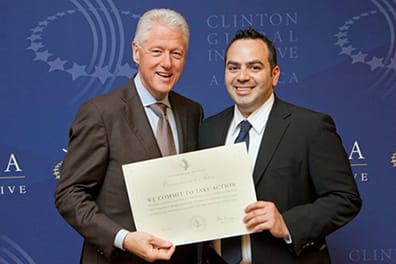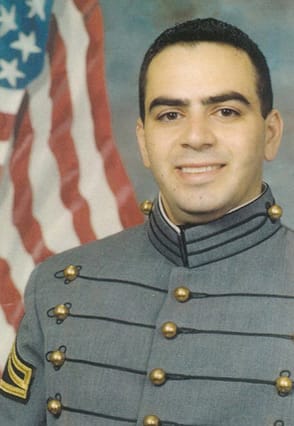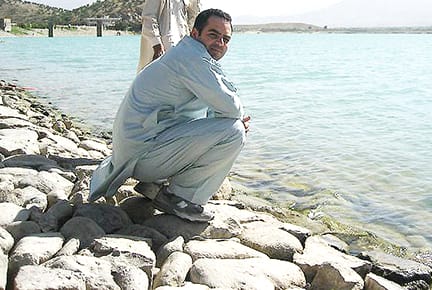Amir Bagherpour’s Political Journey to the US State Department

Amir Bagherpour is proof that a person can embody the best of the American spirit even if born on the other side of the world. Before entering the PhD program at CGU, Bagherpour (MA, International Studies, 2011; PhD, Political Science, 2012) was the first Iranian-born graduate of West Point and one of the cadets chosen to speak with top press outlets following the September 11 attacks. His Army career included training officers from more than 50 allied countries and becoming a Brigade Open Boxing champion. When Bagherpour wanted to find even more ways to serve his country, his studies at CGU provided the opportunity. His doctoral dissertation directly led to becoming a lead analyst and advisor at the State Department’s Bureau of Conflict and Stabilization Operations (CSO).

“Fairly Accurate” Predictions
“One of the reasons I was hired at CSO was because of the empirical validity and accuracy of my dissertation,” Bagherpour said. “I was working in Washington at the Iran research desk at Voice of America while I completed my dissertation. I had just gotten back from Afghanistan where I was using a predictive model to estimate the outcome of the conflict there and the dynamics taking place between Afghanistan and Pakistan. When the Arab Spring broke out, I had all these skillsets that I learned as a PhD student at Claremont, so I shifted my focus to what was taking place in the broader region.”
Bagherpour’s dissertation, “Religion and the Evolution of Democracy: A Revised Selectorate Model for the Arab Spring,” modified existing models for political survival to account for the role of religion and ideology during times of political change. Bagherpour used his new model to predict what would happen in the Arab Spring states.
“Right after Tunisia fell and the protests began in Egypt, I dropped my previous dissertation topic and started making predictions using game theory and agent-based modeling (Editor’s note: see definitions below),” he explains. “By the time I had written papers on what would happen and all these predictions were indexed, I tracked their accuracy. When it showed that they were fairly accurate—around 90%—I put together all these predictions to come up with an extended theory of political science. Basically, the extended theory accounted for what led to the Arab Spring and identified some of the solutions to stability going forward.”
A New Model
Traditional models primarily look at public services and private goods as assets in achieving political stability, but Bagherpour incorporated ideological preference into the equation. At the time, no formal theory explained the role of ideology in people’s calculus for political survival. His dissertation offered a new model for predictive analysis, and these methods are now employed by the State Department to predict global conflicts and reduce cycles of violence. Highlighting the importance of the CSO’s work, Bagherpour and his colleagues produce assessments that are used to brief some of the most senior policy officials within the US government.
“Economic motives are driven by rationality and a desire to maximize one’s goods, but history shows there are many times when people vote against their own interests,” Bagherpour explains. “The previous existing theory suggested the main concern for having a stable government is the right mix of economic incentives. My findings from the Arab Spring showed that economic incentives are not enough to assure survival. It’s ideology as well. It doesn’t just have to be religion, but in the case of the Arab Spring, the dominant driver for how things are going to turn out has been religious preferences.”
“I Wanted to Challenge Myself”
Bagherpour, the son of a successful businessman, was born in Tehran during the Iran-Iraq War. He was five years old in 1986 when the family moved to Los Angeles and later to Irvine, California. While he spoke Farsi at home, he integrated seamlessly into American culture and became vice president of his high school class and captain of the tennis team.

As a teen with numerous opportunities before him, Bagherpour surprised his parents when he joined the military.
“When it came time to go to college,” he recalls, “a lot of my friends were going to good schools, but they were having a normal, expected college experience. I wanted to do something different. I wanted to challenge myself and learn to be a leader and have the chance to serve the nation. I enlisted in the Army with the notion that, if I liked it, I would go to West Point a year later.”
After attending West Point and serving in the Army, Bagherpour continued to push himself to develop a transferrable skillset, not just in education. After getting an MBA at the University of California, Irvine, he reached a juncture. “There came a time when I had to make a decision on whether I wanted to pursue a career in the private or public sector,” said Bagherpour.
From Theory to Practice
“I felt international relations was the field that I had an interest in, so I decided to get my PhD to develop a technical skillset in an applied field that involved trying to resolve conflict. It took me quite a while to figure out my skillset and what I enjoyed doing, but once I figured it out, the rest was not too difficult.”
Last November, Bagherpour gave a presentation (“From Theory to Practice: How Computational Analytics Can Shape the Future of Conflict Stabilization”) as part of the Tuesday Lunch Talk Series held by the School of Social Science, Politics & Evaluation’s Division of Politics & Economics (DPE).
Regarding his CGU experience, Bagherpour empathically states, “Two people that had the greatest impact on my life and how I see the world are Drs. Jacek Kugler and Mark Abdollahian [in DPE]. Those professors made a significant impact on my ability to look at things with intellectual and technical rigor. My experience at Claremont has been just as valuable if not more valuable than my experience as a cadet at West Point or as an MBA student.”
———————
*Game theory: the analytic study of strategic, competitive interaction between individuals, firms, governments, and people.
**Agent-based modeling: a method of studying complex systems—such as a state—composed of independently acting individuals.
——————–
To watch Bagherpour’s November 2013 “From Theory to Practice: How Computational Analytics Can Shape the Future of Conflict Stabilization” presentation, click on the video link below:
http://vimeo.com/83613386